Collection of materials relating to neuro-ophthalmology as part of the Neuro-Ophthalmology Virtual Education Library.
NOVEL: https://novel.utah.edu/
TO
- NOVEL230
| Title | Creator | Description | Subject | ||
|---|---|---|---|---|---|
| 51 |
 |
Neuro-Ophthalmology of Multiple Sclerosis | Emily Sun, Medical Student; Amanda Henderson, MD | Multiple Sclerosis (MS) is the most common neurological disease in young people with an average age of onset between 15 and 35 years old. MS is an autoimmune inflammatory condition that causes demyelinating lesions in the CNS. The diagnosis is clinical, but MRI is typically used to support the diagn... | Multiple Sclerosis; Optic Neuritis; Uveitis; Internuclear Ophthalmoplegia; Nystagmus; Steroids; Demyelinating; Autoimmune |
| 52 |
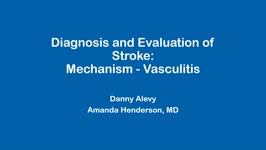 |
Diagnosis and Evaluation of Stroke: Mechanism - Vasculitis | Danny Alevy; Amanda D. Henderson, MD | In this video, we discuss the diagnosis and evaluation of several vasculitides linked to an increase in risk for cerebral ischemic stroke. We focus on ANCA-associated vasculitides, polyarteritis nodosa, Takayasu arteritis, lupus vasculitis, and Susac syndrome, while highlighting their key symptoms a... | Ischemic Stroke; Vasculitis; ANCA-associated Vasculitis; Polyarteritis Nodosa; Takayasu Arteritis; Systemic Lupus Erythematosus; Susac Syndrome |
| 53 |
 |
Sports Related Head Injuries | Jessica Darusz, MD; Sean Gratton, MD | This narrated PowerPoint reviews the basics of sports related head injuries. It emphasizes assessment tools and treatment decisions in assessing athletes with concussion and other head injuries. | Concussion; Sports-related Head Injuries; Post-concussion Syndrome |
| 54 |
 |
Postconcussion Syndrome and Postconcussion Headache | Jessica Darusz, MD; Sean Gratton, MD | This brief presentation describes the pathophysiology, evaluation, and management of concussion, with an emphasis on postconcussion headache. | Concussion; Postconcussion Syndrome; Postconcussion Headache |
| 55 |
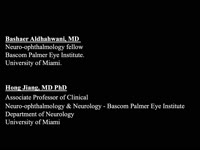 |
Curtain Sign (Enhanced Ptosis) | Bashaer Aldhahwani, MD; Hong Jiang, MD, PhD | This is a 78-year-old male patient who presented with diplopia, right eyelid ptosis, and ophthalmoplegia. He had severe ptosis OD and pseudo-proptosis (lid retraction) OS at baseline, but when the right eyelid was manually elevated, there was marked enhanced ptosis of the left eyelid (Video). He was... | Myasthenia GravIs; Clinical Signs |
| 56 |
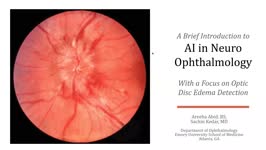 |
A Brief Introduction to AI in Neuro-ophthalmology | Areeba Abid, BS; Sachin Kedar, MD | In this video, we describe the basics of artificial intelligence and machine learning as applicable to clinical neuro-ophthalmologists. We use the example from a recent publication, where AI software was used to detect optic disc edema in fundus images. | Artificial Intelligence; Machine Learning |
| 57 |
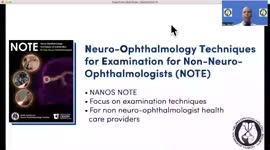 |
Introduction to NANOS NOTE | Karl C. Golnik, MD | Introduction to NANOS NOTE, a resource for non-neuro-ophthalmologists describing common examination techniques. | Neuro-Ophthalmology Examination Techniques |
| 58 |
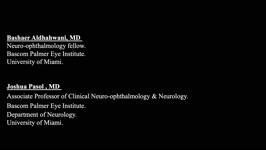 |
Ocular Neuromyotonia Video | Bashaer Aldhahwani, MD; Joshua Pasol, MD | A video demonstrates ocular neuromyotonia in the left eye of a patient with a history of cranial radiation of parasellar mass. Ocular neuromyotonia (ONM) is a rare ocular motor disorder characterized by intermittent, tonic spasms of one or more of the extraocular muscles, resulting in strabismus and... | Ocular Neuromyotonia |
| 59 |
 |
Cogan Lid Twitch | Hari Anandarajah, BA | A 50-year-old woman presented with ptosis of her left eyelid for 6 months. Several exam findings including variable and fatigable ptosis, and Cogan lid twitch, raised suspicion for Myasthenia Gravis. Acetylcholine receptor binding, blocking, and modulating antibodies were negative, and single fiber ... | Lid Twitch; Myasthenia Gravis |
| 60 |
 |
Radiation Optic Neuropathy | Khawla Elnour; Amanda Henderson, MD | A video describing optic neuropathy related to radiation. | Radiation; Neuropathy |
| 61 |
 |
Vogt-Koyanagi-Harada Syndrome | Shwetha Mudalegundi, Medical Student; Amanda D. Henderson, MD | Vogt-Koyanagi-Harada (VKH) syndrome is a rare disorder that affects several body systems. Here we take a broad look at the presentation and pathophysiology of VKH, with a more specific focus on the relevant eye findings. Since much is not known about VKH, we explore the current standards for diagnos... | Vogt-Koyanagi-Harada Syndrome; Uveitis |
| 62 |
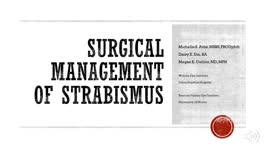 |
Surgical Management of Strabismus | Michelle S. Attzs, MBBS, FRCOphth | This is a brief introduction to the surgical management of strabismus. It includes the key elements of the work up for a patient about to undergo strabismus surgery, introduces the basics on surgical techniques including adjustable sutures, and discusses the complications associated with this surger... | Strabismus; Surgery; Ocular Motility; Adjustable Sutures; Esotropia; Exotropia; Complications |
| 63 |
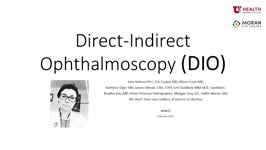 |
Direct-Indirect Ophthalmoscopy (DIO) | Irina Krikova, PA-C; Eric Caskey, MD; Alison Crum, MD; Kathleen Digre, MD; James Gilman, CRA, FOPS; Levi Goldfarb, MBA, MD Candidate; Bradley Katz, MD; Ethan Peterson, Videographer; Meagan Seay, DO; Judith Warner, MD | A slideshow describing the use of the direct ophthalmoscope. | Ophthalmoscopy |
| 64 |
 |
John Cunningham Virus | Alison Gibbons; Amanda D. Henderson, MD | This learning object is a narrated Power Point presentation describing the features of, risk factors for, and clinical presentations of the John Cunningham, or JC, virus. It includes a discussion of various immunosuppressed states, including HIV, use of natalizumab (a disease-modifying therapy that ... | John Cunningham Virus; JC Virus; Natalizumab |
| 65 |
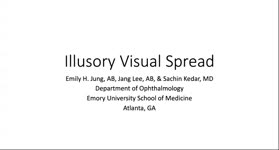 |
Illusory Visual Spread | Emily H. Jung, AB; Jang Lee, AB; Sachin Kedar, MD | Illusory visual spread is a form of visual perseveration resulting in images appearing to spread beyond it normal confines. In this video we describe a patient with Parkinson's disease and dementia, who developed various forms of visual hallucination including palinopsia and illusory visual spread. ... | Visual Perseveration; Illusory Visual Spread; Visual Hallucination |
| 66 |
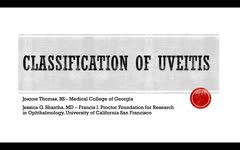 |
Classification of Uveitis | Joanne Thomas, BS; Jessica Shantha, MD | This is an overview of the classification of uveitis. Topics discussed include: SUN anatomic classification, characterization of uveitis descriptors, AC cell and AC flare classification, and terminology of activity. | Uveitis; Classification; SUN |
| 67 |
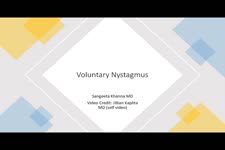 |
Voluntary Nystagmus | Sangeeta Khanna, MD | A short presentation on the phenomena of voluntary nystagmus. | Nystagmus; Voluntary Nystagmus |
| 68 |
 |
Visual Fields | David Zhao; Amanda Henderson, MD | Video presentation covering a thorough overview of visual fields. | Visual Fields |
| 69 |
 |
Nystagmus Elicitation Techniques | Jorge C. Kattah, MD | An examination of the patient days or weeks after the acute event requires fixation block, and a variety of techniques, known as nystagmus elicitation maneuvers to detect the recent vestibular imbalance. | Nystagmus |
| 70 |
 |
Sensory Nystagmus | Tony Brune, DO; Jonathan D. Trobe, MD; Raed Behbehani, MD | A video describing sensory nystagmus. | Nystagmus; Sensory Nystagmus |
| 71 |
 |
Optical Coherence Tomography Angiography | David Zhao; Amanda Henderson, MD | Video presentation covering a thorough overview of Optical Coherence Tomography Angiography (OCTA). | Optical Coherence Tomography Angiography; OCTA |
| 72 |
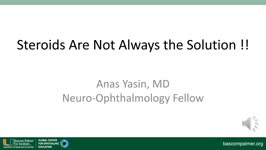 |
Steroids Are Not Always the Solution!! | Anas Yasin, MD | Leber Hereditary Optic Neuropathy (LHON) is the most common inherited mitochondrial disorder and typically affects young males. (https://eyewiki.aao.org/Leber_Hereditary_Optic_Neuropathy) | Leber Hereditary Optic Neuropathy (LHON) |
| 73 |
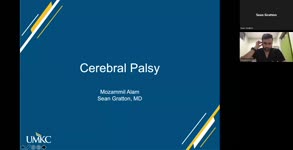 |
Cerebral Palsy | Mozammil Alam, Medical Student; Sean Gratton, MD | This video covers an overview of cerebral palsy. | Cerebral Palsy |
| 74 |
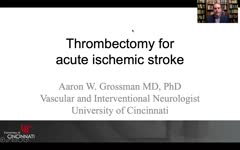 |
Thrombectomy for Acute Ischemic Stroke | Aaron W. Grossman, MD, PhD | A video overview of thrombectomy of acute ischemic stroke. Covers anatomy, history of treatment, and current practice. | Thrombectomy; Acute Ischemic Stroke |
| 75 |
 |
Behcet's Disease | Harinee Arunachalam, MSIV; Sean Gratton, MD | This video provides an overview of Behcet's Disease, a rare vasculitis of unknown etiology. | Behcet's Disease |
